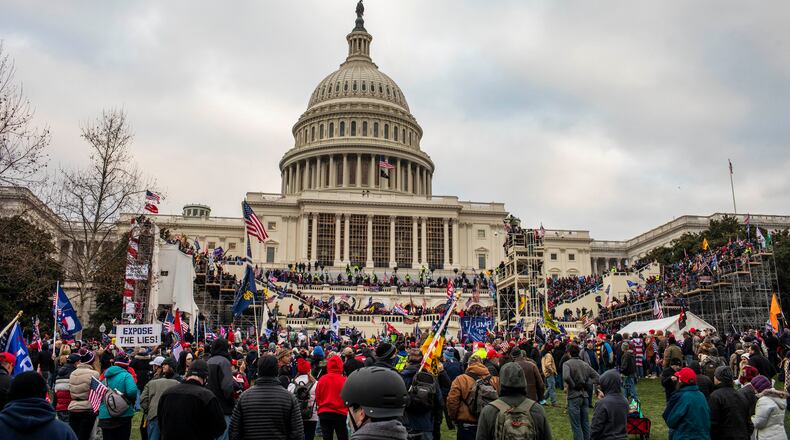People need to leave their social media and news echo-chambers, get to know others they might not agree with and intervene when loved ones fall into conspiratorial “wormholes,” Hannah said.
“Unfortunately, we have a number of charismatic charlatans who have realized that they can profit from doubling down and tripling down on these conspiracy theories. So, we’re in a bit of a downward spiral right now,” he said.
Unity will be hard to achieve in the current “toxic brew” created by “social media, our gullibility, narrow-casting media outlets, or craven elites on both sides who feed fear and anger,” said Mark Caleb Smith, director of Cedarville University’s Center for Political Studies.
“We see that violent and hateful rhetoric can have serious, even deadly, consequences,” said Christopher Devine, assistant professor of political science at the University of Dayton.
Role of conspiracy theories
The riot happened after Trump urged protesters to come to Washington on Wednesday when Congress was counting the Electoral College votes declaring Democrat former Vice President Joe Biden and U.S. Sen. Kamala Harris the winners. They beat Trump and Vice President Mike Pence by more than 7 million votes on Nov. 3 and in the Electoral College 306 to 232.
Since election day Trump and his allies have contended without proof that massive fraud and voting irregularities resulted in the election being stolen from him. Those claims, some involving elaborate international conspiracy theories, were found to be baseless across the nation in nearly 60 court cases, by state and local officials and the U.S. Justice Department.
“Americans are very inclined to believe conspiracies. It waxes and wanes over time,” said Paul Beck, professor emeritus of political science at the Ohio State University. “What’s different today is that you have a series of conspiracies and conspiracy theories that are perpetrated by the president of the United States, who has a powerful megaphone. There are a lot of people who believe what comes out of the president’s mouth.”
Trump spoke to at a rally prior to the riot, urging protesters to march on the U.S. Capitol to protest “this egregious assault on our democracy.” As they reached the Capitol, thousands broke through barriers, and clashed with police before breaking into the building, where they trashed offices, broke windows and furniture and stole things. Police killed a protester, one police officer died of injuries and three other people died in medical emergencies. Multiple police officers were injured.
Congress members were evacuated but later reconvened to affirm the Biden/Harris win over the objections of 147 Republican Senate and House members.
The immediate impact is playing out now, with calls for Trump’s impeachment, removal using the 25th Amendment or resignation before Biden is inaugurated on Jan. 20.
“This really opened up the divisions within the GOP. The Republicans in the House are nearly even divided among those who have accepted the results and those that continue to parrot President Trump’s talking points about the election,” Hannah said. “In the Senate, I will be curious to see if there are repercussions for Sens. Josh Hawley, R-Missouri, and Ted Cruz, R-Texas, in particular, who led this charge.”
Impact going forward
Key questions going forward for Republicans are how much of the broader Republican Party is alienated by the violence and what will be the role of Trump’s base, Beck said.
“He’s done things that are not worthy of a president and things that basically define him as a whiner and a sore loser,” Beck said. “I think there will be a number of people who voted for him who will say, ‘I can’t accept that.’”
Marc Clauson, a professor of history and law at Cedarville University, said future historians will determine if the assault on the Capitol is a pivotal moment in the nation’s history.
He expects it will shore up divisions that already exist in the country and must be addressed.
“Maybe that’s the bigger turning point. We’re so polarized,” Clauson said. “It’s getting more radically polarized. But we’ll have to wait and see exactly how this particular event plays into it.”
Beck said about two-thirds of the 73 million people who voted for Trump believe the election was stolen from him, despite the lack of evidence.
Credit: Contributed
Credit: Contributed
People need to begin to look at information more critically and do fact-checks using reputable sources rather than “looking at things through partisan lenses,” said Beck.
“There really is an effect that is caused by politicians themselves who are in what we would think are responsible positions, many of them members of the House of Representatives or the U.S. Senate. And many of them governors who are lending credence to these kinds of charges that are out there,” Beck said.
“One way to prevent it is to make sure that we don’t have political leaders who are fanning these flames.”
The attack draws needed attention to the problem of domestic terrorism, Beck said.
“We know they are out there, we know that there are these militia movements that have been there a long time. Remember the Oklahoma City bombing,” Beck said. “We do indeed have domestic terrorists.”
What will be the international fall out?
Repercussions of the attack go beyond the U.S., said Jacque Kahindo, a history instructor at Wilberforce University. It might make the country look weak to the international community at the moment, he said.
Even so, Kahindo said the U.S. continues to be one of the strongest in the world in terms of its democracy and military power. The damage to the nation’s reputation and international relationships will likely be repaired once Biden is sworn in, he said, and brings to bear his broad geo-political experience and the respect of allies he has after his years as vice president.
The challenge for Biden will be to bring the country together, Kahindo said, and mend the deep wounds before things get even more out of hand.
“(The country) is fragile, and we’re moving toward a very, very dangerous situation,” Kahindo said. “So if the Biden administration can move quickly in uniting the country and (persuading people that) conflict and violence don’t have a place, I’m thinking everything will be OK.”
While the Capitol breach is a symbol of democracy being attacked from within, Kahindo believes the incident can help the country come together, heal and show the stability of American democracy.
“We can be shaken, but we can stick together, and we can succeed,” Kahindo said.
Will access to the Capitol change?
The breach will undoubtedly lead to changes in security at the Capitol, said Clauson.
That likely will include an extra ring of security fencing that expands into the Capitol neighborhood, said Glen Duerr, an associate professor of international studies at Cedarville. Tours will probably resume, but the experience will not be the same, he said, particularly for school children.
“In a way it’s kind of sad because you’d like to know that you could just have access to those famous buildings, but what do you do?” Clauson said.
Hannah said authorities need to assume that pro-Trump protesters will come back for Biden’s inauguration and prepare a far more robust defense.
“I guess there are two major concerns now,” he said. “How does law enforcement go about securing the Capitol and holding the insurrectionists accountable and how does Congress respond?”




